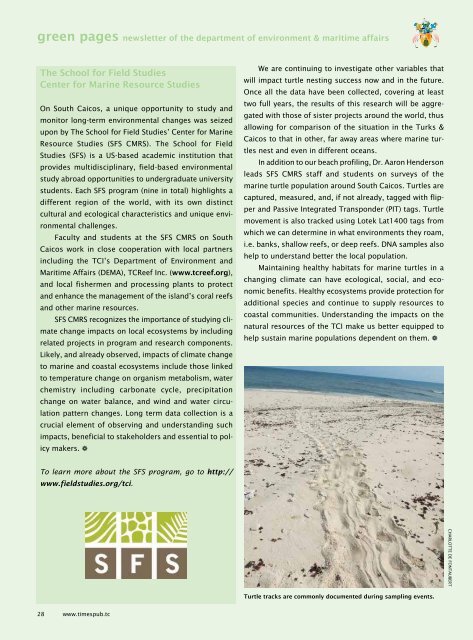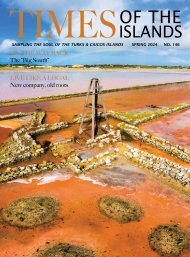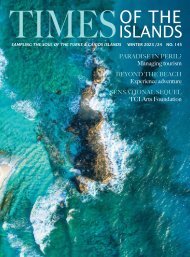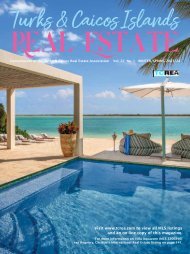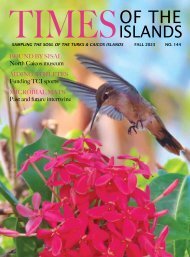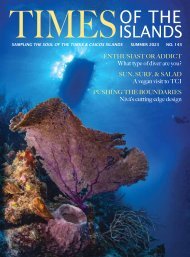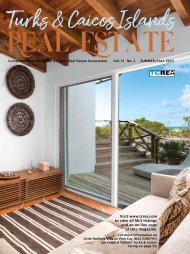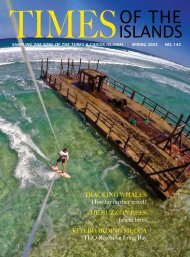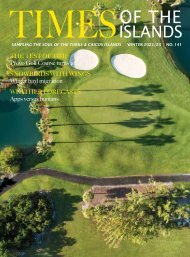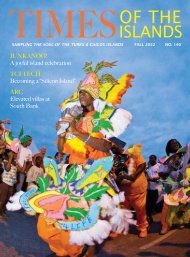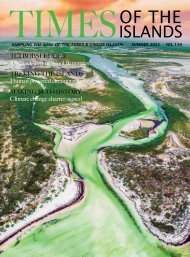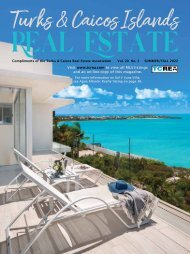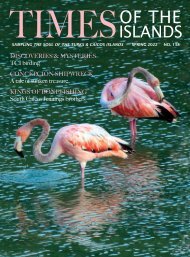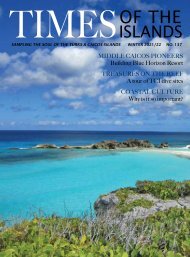Times of the Islands Summer 2015
Presents the "soul of the Turks & Caicos Islands" with in-depth features about local people, culture, history, environment, businesses, resorts, restaurants and activities.
Presents the "soul of the Turks & Caicos Islands" with in-depth features about local people, culture, history, environment, businesses, resorts, restaurants and activities.
You also want an ePaper? Increase the reach of your titles
YUMPU automatically turns print PDFs into web optimized ePapers that Google loves.
green pages newsletter <strong>of</strong> <strong>the</strong> department <strong>of</strong> environment & maritime affairs<br />
green pages newsletter <strong>of</strong> <strong>the</strong> department <strong>of</strong> environment & maritime affairs<br />
The School for Field Studies<br />
Center for Marine Resource Studies<br />
On South Caicos, a unique opportunity to study and<br />
monitor long-term environmental changes was seized<br />
upon by The School for Field Studies’ Center for Marine<br />
Resource Studies (SFS CMRS). The School for Field<br />
Studies (SFS) is a US-based academic institution that<br />
provides multidisciplinary, field-based environmental<br />
study abroad opportunities to undergraduate university<br />
students. Each SFS program (nine in total) highlights a<br />
different region <strong>of</strong> <strong>the</strong> world, with its own distinct<br />
cultural and ecological characteristics and unique environmental<br />
challenges.<br />
Faculty and students at <strong>the</strong> SFS CMRS on South<br />
Caicos work in close cooperation with local partners<br />
including <strong>the</strong> TCI’s Department <strong>of</strong> Environment and<br />
Maritime Affairs (DEMA), TCReef Inc. (www.tcreef.org),<br />
and local fishermen and processing plants to protect<br />
and enhance <strong>the</strong> management <strong>of</strong> <strong>the</strong> island’s coral reefs<br />
and o<strong>the</strong>r marine resources.<br />
SFS CMRS recognizes <strong>the</strong> importance <strong>of</strong> studying climate<br />
change impacts on local ecosystems by including<br />
related projects in program and research components.<br />
Likely, and already observed, impacts <strong>of</strong> climate change<br />
to marine and coastal ecosystems include those linked<br />
to temperature change on organism metabolism, water<br />
chemistry including carbonate cycle, precipitation<br />
change on water balance, and wind and water circulation<br />
pattern changes. Long term data collection is a<br />
crucial element <strong>of</strong> observing and understanding such<br />
impacts, beneficial to stakeholders and essential to policy<br />
makers. a<br />
We are continuing to investigate o<strong>the</strong>r variables that<br />
will impact turtle nesting success now and in <strong>the</strong> future.<br />
Once all <strong>the</strong> data have been collected, covering at least<br />
two full years, <strong>the</strong> results <strong>of</strong> this research will be aggregated<br />
with those <strong>of</strong> sister projects around <strong>the</strong> world, thus<br />
allowing for comparison <strong>of</strong> <strong>the</strong> situation in <strong>the</strong> Turks &<br />
Caicos to that in o<strong>the</strong>r, far away areas where marine turtles<br />
nest and even in different oceans.<br />
In addition to our beach pr<strong>of</strong>iling, Dr. Aaron Henderson<br />
leads SFS CMRS staff and students on surveys <strong>of</strong> <strong>the</strong><br />
marine turtle population around South Caicos. Turtles are<br />
captured, measured, and, if not already, tagged with flipper<br />
and Passive Integrated Transponder (PIT) tags. Turtle<br />
movement is also tracked using Lotek Lat1400 tags from<br />
which we can determine in what environments <strong>the</strong>y roam,<br />
i.e. banks, shallow reefs, or deep reefs. DNA samples also<br />
help to understand better <strong>the</strong> local population.<br />
Maintaining healthy habitats for marine turtles in a<br />
changing climate can have ecological, social, and economic<br />
benefits. Healthy ecosystems provide protection for<br />
additional species and continue to supply resources to<br />
coastal communities. Understanding <strong>the</strong> impacts on <strong>the</strong><br />
natural resources <strong>of</strong> <strong>the</strong> TCI make us better equipped to<br />
help sustain marine populations dependent on <strong>the</strong>m. a<br />
The healthy and colorful reefs that line Turks & Caicos shores are one <strong>of</strong> <strong>the</strong> country’s most precious commodities.<br />
SEAN BRADY–KAIERI PHOTOGRAPHY<br />
To learn more about <strong>the</strong> SFS program, go to http://<br />
www.fieldstudies.org/tci.<br />
Going Strong<br />
The Turks & Caicos Reef Fund celebrates five years <strong>of</strong> positive impact.<br />
Turtle tracks are commonly documented during sampling events.<br />
CHARLOTTE DE FONTAUBERT<br />
Story & Photos By Don Stark, Chairman, Turks & Caicos Reef Fund<br />
Environmental protection in <strong>the</strong> Turks & Caicos <strong>Islands</strong> has been a hit or miss affair for many years.<br />
The Department <strong>of</strong> Environment and Maritime Affairs (DEMA), <strong>the</strong> governmental agency responsible for<br />
environmental protection, has been chronically underfunded and understaffed for more than a decade.<br />
The so-called Conservation Fund, which no longer exists, served virtually no conservation purpose and<br />
mostly funded non-conservation projects in <strong>the</strong> TCI.<br />
28 www.timespub.tc<br />
<strong>Times</strong> <strong>of</strong> <strong>the</strong> <strong>Islands</strong> <strong>Summer</strong> <strong>2015</strong> 29


